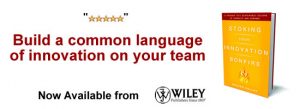Even Sheep Avoid the Commodity Trap

One of the unwritten rules of Lovemarks is don’t get stuck in the commodity quadrant, the realm of raw products and raw actions. For service industries like travel, this is unforgivable, which is why I will only fly on an American airline out of desperation or duress.
For land based industries which originate in the commodity zone, global integration has laid down hotly contested conditions that demand re-positioning. How to climb the value chain onto a premium rung as value gets redefined around rising standards of quality and sustainability? The answer lies in an end-to-end story of value that turns the ordinary into the extraordinary.
Being from New Zealand, where the sheep outnumber the people (see the comedy horror movie Black Sheep for the dark and ridiculous side of this), I’m excited to see the unveiling of Laneve, a new wool brand from Wool Partners International, a joint venture headed by top business leader, Theresa Gattung, and an old mate of mine, Iain Abercrombie. This luxe evolution of the Wools of New Zealand brands brings the attributes of the wool itself right to the fore.
Here’s how the story stacks up. New Zealand produces 30% of the world’s strong wool (used mainly for carpets), it’s the highest quality but we’re not leveraging this scale and quality advantage. Prices paid to farmers for wool have steadily fallen for two decades and incredibly are now well less than half what they were 20 years ago. This has led to New Zealand sheep numbers halving over that period (from 60 million to 30 million). New Zealand needs agricultural diversity – and sheep are low impact on the environment. In the US only 3% of carpets sold are wool, the rest synthetic (i.e. made from petroleum based products). The synthetics guys have comprehensively outmarketed wool, which used to be the dominant fibre for flooring. Wool ought to be a marketers dream – it’s a sustainable raw product which makes beautiful end products, in a world crying out for authenticity. Bringing that story to the fore and directly connecting producers and consumers is what Laneve (from Laneus, which is Latin for wool and weave) is about.
 Laneve’s fibre integrity is woven in its farming practices, animal welfare, sustainability, traceability, and environmental standards; issues that are right up the brand street of high-end American consumers. By setting a critical supply standard and tracking the wool only from accredited growers through scouring and spinning right to the finished product at point of sale, the commodity trap gets sprung.
Laneve’s fibre integrity is woven in its farming practices, animal welfare, sustainability, traceability, and environmental standards; issues that are right up the brand street of high-end American consumers. By setting a critical supply standard and tracking the wool only from accredited growers through scouring and spinning right to the finished product at point of sale, the commodity trap gets sprung.
Wool Partners already has direct deals with U.S. carpet makers for launch at trade fairs in the northern winter, and there’s more in the works. It’s a sustainable story you can follow that delivers through the line. Laneve is pumping in the premium, and that’s the new game that really matters to New Zealand.
Image Credit: Rangoli Rug by Nani Marquina, made from New Zealand Wool.
 Kevin Roberts is the CEO worldwide of The Lovemarks Company, Saatchi & Saatchi. For more information on Kevin, please go to www.saatchikevin.com. To see this blog at its original source, please go to www.krconnect.blogspot.com.
Kevin Roberts is the CEO worldwide of The Lovemarks Company, Saatchi & Saatchi. For more information on Kevin, please go to www.saatchikevin.com. To see this blog at its original source, please go to www.krconnect.blogspot.com.
NEVER MISS ANOTHER NEWSLETTER!
LATEST BLOGS
Starbucks and Big Tobacco
Back in the 1950’s smoking was glamorous, and just about everybody who was anybody smoked cigarettes. Then came the discovery, to the shock of millions, that sucking smoke into your lungs might not be good for you. Then came another revelation that one of the substances in tobacco, nicotine, which was used as a poison by the Egyptians during the times of the Great Pyramids, is addictive. People then began a mass exodus from the consumption of nicotine via inhaled smoke.
Read MoreWal-Mart Goes Green – What about your company?
With the price of gas above $3.00, some companies (and hopefully all) are beginning to look at the fuel efficiency of their fleets. Wal-Mart is the most public example of this with its trucking fleet. Its efforts include:
Read More


